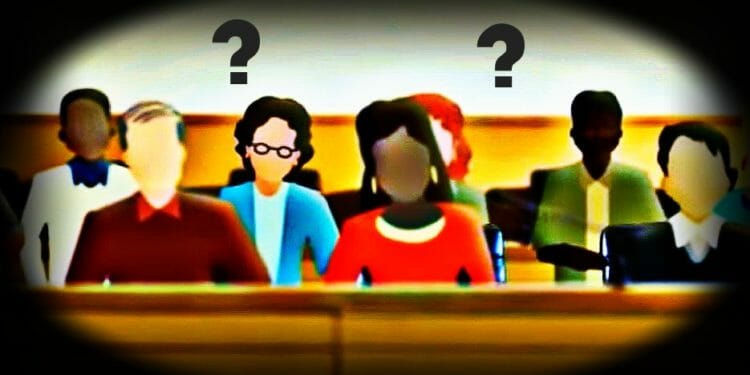Race continues to be a key issue during jury selection in excessive use of force cases and many other types of trials. This fact was vividly and achingly brought home once again when, about a year ago, the video of a Black man (George Floyd) gasping for air while being pinned beneath a White officer’s (Derek Chauvin) knee went viral. Those wrenching images brought millions of people into the streets to demand justice and forced a national reassessment of race and police policy. It is no surprise that the trial of Chauvin was described as “One of the most important trials America has ever seen.”
The case was challenging for the jury to decide–not only did it involve the police, but it also involved race. For the same reasons, it was no easy feat to select jurors who could decide the case impartially. “Race” was a major consideration during jury selection because institutional racism in the legal system leads to unjust outcomes for Black defendants and victims in criminal as well as civil cases. Many studies show that Black people are treated unfairly in the legal system, some of which have been documented by The Innocence Project.
This article is intended to help familiarize the reader with systemic racism and offers suggestions on how to select a jury that is less likely to be affected by racial bias. We hope our research will help viewers better understand jury selection when next watching a major trial being broadcast across the country and world and help prospective jurors who are called to serve in their own communities.
What is Racism?
Racism is a system of beliefs, practices, and policies that operates to advantage those with historical power. In psychological terms, racial bias is belief, racial discrimination is behavior, and structural racism is policy. Racism, as a dynamic system, groups people based on shared physical and social characteristics, such as skin color, physical characteristics, dress style, place of origin, or speech pattern. Therefore, racism is not biological; it is sociological. In the United States, racism functions as a social caste system that favors Whites by presuming their superiority over all other races, including Blacks.
Pervasive Racism in the Judicial System
Racism pervades every facet of the American judicial system, resulting in unequal treatment of Black Americans. As a result, Black Americans are arrested more frequently, convicted of crimes more often, and sentenced to prison for longer terms than White Americans for the same crimes. In addition, Black Americans are less likely to be released from jail than their White counterparts because of bail and probation barriers.
The U.S. Constitution prohibits dismissing a juror purely because of their race. Yet all courts permit an attorney to remove a potential juror for no reason — known as a peremptory challenge — permitting racism to infiltrate the juror selection process.
In criminal trials, for example, prosecutors exclude disproportionately significant percentages of Black individuals from jury pools, and Black criminal defendants continue to be prosecuted by all or predominantly White juries. Yet despite data showing that diverse juries analyze more case facts, make fewer errors, and deliberate longer than all-White juries, several independent regional investigations conclude that juror exclusion based on race still occurs.
In sum, existing case law has not yet produced a juror selection method that is comprehensive, totally equitable, and justly applied. Perhaps understanding psychology can aid in fulfilling the Constitutional promise of racism-free jury selection.
Selecting a Fair Jury
The purpose of jury selection is to choose a fair jury that will focus on the evidence presented at trial and reach a decision free of prejudice and bias. A familial, employment, renting, or loan relationship with a party, as well as employment as an attorney or in public law enforcement, are all examples of bias and prejudice recognized by the law. Likewise, a juror who has racist beliefs will be unsuitable to decide cases involving a Black criminal defendant or issues of race, such as police brutality against Black citizens or race-based employment, housing, or other unfair treatment.
In fact, in 2017, the Supreme Court decided that jurors may testify about how race influenced jury deliberations and that influence can require overturning the verdict. A new trial will be held if it is found that an attorney did not rid a jury of racism.
Psychology Insights
Several demographic, sociological, and psychological variables are involved in jury deliberation and decision-making, according to social science, including explicit and implicit racial prejudices, cultural norms, and group behavior. Evidence-based means can help attorneys identify when a juror is biased against one race or another by looking at their attitudes and past behaviors.
Among the 14 jurors who were chosen to decide on Chauvin’s trial, eight were White, four were Black, and two were mixed race. However, jury selection is more than just having a diverse sample of people on the jury. In fact, from a psychology perspective, selecting a jury that will not let racism influence their deliberation is a complex process. While some White individuals can be fairly easily identified as holding racist viewpoints, others might have implicit — unconscious — bias.
Aversive racism, a psychological term for seeming impartial by presenting as unbiased on the outside while having biased attitudes on the inside, is more difficult to spot. Black jurors’ deliberations might also be affected by “internalized racism.” Additionally, people might be non-racist bystanders or racial justice allies. The former’s deliberation will be more easily influenced by White people with explicit or implicit bias, while the latter will be more likely to focus on the facts of the case without having racism pervade their decision-making process.
Therefore, in the process of jury selection, the focus should not be on a person’s race, but rather on racism and one’s attitudes and behaviors toward people of various races.
Judges and attorneys can screen jurors by using validated psychological questionnaires or by asking questions of the jury — termed “voir dire.” They can even go one step farther and choose as many anti-racist jurors as possible to guarantee that decisions are made in accordance with the law and based on evidence, rather than racism.
Non-racism is a distinct concept from anti-racism. People with an anti-racist orientation constantly reevaluate their motivations and seek to guarantee that racism does not impact their impartiality. Even in the face of social disapproval, anti-racists are willing to stand up on behalf of people with less social power.
Types of Racism and Recommended Questionnaires
1. Dominative Racism: Dominative racism is a type of prejudice that has been around for a long time, often described as “old-fashioned racism.” A dominative racist “acts out bigoted beliefs—he represents the open flame of racial hatred.” Dominative racism is explicit racism that includes racial insults, threats, and acts of racial violence.
2. Symbolic Racism: Symbolic racism is sometimes known as “modern racism,” and also referred to as “right-wing racism.” A symbolic racist embraces negative stereotypes about people of color. For example, a symbolic racist might believe that Black people are morally inferior to Whites because they choose welfare over labor and have criminal inclinations.
Potential jurors who exhibit dominative or symbolic racism will be unable to make an unbiased decision because they will not regret finding a defendant guilty in the absence of evidence. These jurors are likely to conclude that a Black defendant “must have done something wrong” or “we are all safer with that kind of person off the streets.”
Some established psychological tests can be used to screen out jurors who hold explicitly racist beliefs, including The Modern Racism Scale, the Color-Blind Racial Attitudes Scale, and the Symbolic Racism 2000 Scale. The use of these sorts of questionnaires makes it reasonably easy to identify and eliminate dominant and symbolic racism from jury pools.
3. Aversive Racism: Aversive racism can be thought of as “left-wing racism.” When confronted with people of color, an aversive racist claims support for racial equality, yet harbors confused negative sentiments. These contradictory sentiments are typically unconscious or implicit. Aversive racists may verbally state that they support social justice and have anti-racist views. Still, their actions are affected by their racism. As a result, their behaviors are more reliable indicators of who they are than their expressed opinions.
There are not yet validated written psychological tests that can be used to detect aversive racists. Therefore, identifying jurors who are influenced by aversive racism is more difficult than identifying those who are impacted by dominative or symbolic racism.
Nevertheless, certain questions may be asked to help detect aversive racists among a potential jury pool. One simple question that may be helpful is: “Do you have any Black friends”? To ensure that someone who says they have Black friends is not referring exclusively to Black coworkers, family, or a romantic partner, an attorney will need to ask follow-up questions. Having a genuine personal interaction with Black individuals will reveal that they are not instinctively avoiding Black people.
Voir dire questions exploring prior acts can also be asked if the trial is held in a location where the jury pool is mostly White. An example of such a question would be: “Describe your most significant interaction with a member of another race.” Potential jurors who have lived and worked in areas devoid of Black people might be asked what they did when they witnessed various forms of racism. For example: “Have you ever told someone you didn’t appreciate a racist joke or comment? What did you say to them and why?”
Many people in the United States associate genetic meanings or “natural” classifications to races that are not supported by scientific research. To establish if aversive racism prevents potential jurors from being unbiased decision-makers, or whether it could unconsciously persuade them to decide against a client, asking questions regarding genetics may be helpful.
For example, an attorney or judge might ask “Certain races/ethnicities are genetically/naturally more intelligent than others,” or “Black people naturally feel less pain than other races,” or “There is probably a genetic reason for IQ test differences between Asians and Whites.” Attorneys should use a combination of for-cause and peremptory challenges to choose jurors who reject race-intelligence connections.
Furthermore, by asking inquiries about biology or genetics and race, an attorney may be able to find racial justice allies. Allies are likely to explicitly reject the genetic basis for racial differences. Notably, The Black-White Implicit Association Test (IAT) can also help detect aversive racists, especially when combined with the questions above. However, one issue with this test is that it needs to be completed on a computer.
4. Internalized racism: Internalized racism occurs when individuals of color have negative attitudes about other people of color and feel that it is better to be White. Some internalized racists maintain self-hatred, which might be unconscious or implicit. Sometimes, they may adopt a manner of dressing or speech pattern that they deem White in order to distinguish themselves from their own race. They may also try to act like their impression of a White person or prefer to spend time with White people over individuals of color, especially those of their own perceived race.
People of color may not automatically be anti-racist or non-racist. Some individuals of color, who have been exposed to racist social messaging, may also hold implicit racial prejudices against other ethnoracial groups or even their own group.
Initial questions an attorney or judge can ask to determine whether a potential jury has internalized racism are similar to ones they could ask to determine whether a juror has symbolic racism. For instance, “Is race an impediment toward getting ahead in America today?” A person of color with internalized racism may believe they succeeded without impediment.
5. Passive bystanders: A passive bystander (non-racist) does not actively engage in racist behavior but is able to recognize when others are acting under the impact of racism. They will not, however, interfere to halt the discriminatory behavior of others.
If White passive bystanders are surrounded by other White people while serving on a jury, they may be less likely to speak out against racism (for example when a White juror makes a racially charged statement), even if other jurors of color are present.
An attorney might use a peremptory challenge to remove a passive bystander from the jury. For example, they may ask: “Think of a recent time that you saw a Black person being mistreated. What did you do?” Another example would be: “Have you ever heard anyone at your workplace say something racially insensitive to a Black person (or another person of color if there are no Black people in your workplace). What did you do?” Those who have taken no action or only taken action by apologizing to the Black person later are unlikely to speak up when racism enters jury deliberations.
6. Racial Justice Allies: A racial justice ally is devoted to anti-racist behavior. When it comes to social risk, they will, for example, intervene to stop other people from committing discriminatory acts. Racial justice allies give up racial privileges in exchange for anti-racist ideals, promoting them via a determined effort.
Racial justice allies are excellent candidates for unbiased and fair juries. In every area of their life, White allies are equally tolerant towards people of color as they are toward White people.
Racial justice allies can highlight instances of racism and describe how they interfered when jurors are asked about their prior acts during voir dire. One such question would be: “What kinds of things have you done to address racism in your own thinking and actions?” This is hard work, and racial justice allies will be happy to discuss how they have tackled these issues in their own lives.
Conclusion: For a Fair Society, We Must Get Better at Selecting Jurors
Explicit and implicit racial bias impair everyone’s capacity to live in a just society and undermine the idea of equal treatment under the law. Unfortunately, jury selection has been racially biased historically and currently. Direct questions regarding racism or asking jurors to self-identify as racist will not exclude racist jurors from a jury pool.
To fulfill the promise of an equitable society, we must get better at selecting anti-racist, justice-minded jurors. We believe that judges and attorneys should employ more sophisticated psychological examinations and questions during voir dire to identify biased jurors. Aside from that, attorneys should utilize peremptory challenges as a chance to weed out passive bystander jurors and include more anti-racist jurors on the jury.
To that purpose, this article offered a valuable classification of different types of individual racism, as well as examples of surveys and voir dire questions that could be used in jury selection. Finally, we advocate for the creation of specialized tools and training on racism in jury selection to develop a systematic response to these concerns in order to ensure the impartiality of the justice system. Our full research article, Challenging Jurors’ Racism, where you can read more about this topic, is forthcoming in Gonzaga Law Review.
Editor’s Note: The opinions expressed here by Impakter.com columnists are their own, not those of Impakter.com. — In the Featured Photo: Jury selection process, photomontage by Impakter










